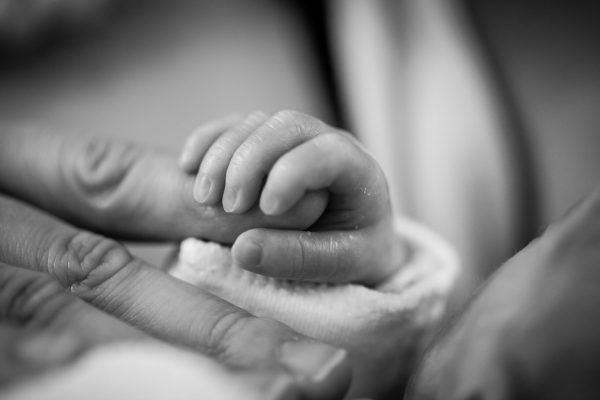Welcoming the New Baby
At the start of the ceremony, the baby’s parents or people they selected for this honor bring her into the hall. The baby is greeted customarily with the recitation of Biblical verses or with song. Any tune or song that is related somewhat to birth or daughters or the like is suitable, as is one of the poems written specifically in honor of girls. If you want to increase the sense of community involvement and acceptance, you can ask your guests to form two lines, and to pass the baby from one to another, as was customary in old Sephardic ceremonies. Alternatively, you could have your baby passed among the girls in your family to symbolize the link between the generations.
בְּרוּכָה הַבָּאָה בְּשֵׁם אֲדֹנָי
B’rukhah ha-ba’ah b’shem Adonay.
Blessed is she who comes in the name of God.
(based on Tehillim 118:25, parallel to the welcoming verse recited at a Brit)
בְּרוּכָה אַתְּ לָאֲדֹנָי בִּתִּי
B’rukhah at l’Adonay, biti.
Blessed are you of God, my daughter. (Ruth 3:10)
מִי זֹאת הֲנִשְׁקָפָה כְּמוֹ שַׁחַר: יָפָה כַלְּבָנָה, בָּרָה כַּחַמָּה, אֲיֻמָּה כַּנִּדְגָּלוֹת
Mi zot ha-nishkafah k’mo shakhar, yafah khal’vanah,
barah k’khamah, ayoomah kanidgalot.
Who is she that looks out like the dawn, fair as the moon, clear as the sun, and terrible as an army with banners. (Song of Songs 6:9)
בְּרוּכָה אַתְּ בָּעִיר וּבְרוּכָה אַתְּ בַּשָּׂדֶה בְּרוּכָה אַתְּ בְּבֹאֶךְ וּבְרוּכָה אַתְּ בְּצֵאתֶךְ
B’rukhah at ba’ir u-v’rukhah at ba-sadeyh,
B’ruchah at b’vo’ekh u-v’ruchah at bi-tzetekh.
Blessed are you in the city, and blessed shall you be in the field.
Blessed shall you be when you come in, and blessed shall you be when you go out. (Deuteronomy 28:3, 6)
יוֹנָתִי בְּחַגְוֵי הַסֶּלַע בְּסֵתֶר הַמַּדְרֵגָה הַרְאִינִי אֶת מַרְאַיךְ הַשְׁמִיעִינִי אֶת קוֹלֵךְ כִּי קוֹלֵךְ עָרֵב וּמַרְאֵיךְ נָאוֶה
O my dove, who is in the clefts of the rock, in the secret places of the cliff, let me see your countenance, let me hear your voice, for sweet is your voice and your countenance is comely. (Song of Songs 2:14)
אַחַת הִיא יוֹנָתִי תַּמָּתִי אַחַת הִיא לְאִמָּהּ בָּרָה הִיא לְיוֹלַדְתָּהּ. רָאוּהָ בָּנוֹת וַיאַשְׁרוּהָ מְלָכוֹת וּפִילַגְשִׁים וַיְהַלְלוּהָ
Akhat he yonati, tamati, akhat he l’imah, barah he l’yolad’tah.
Ra’uhah banot vay’ashruhah malkhot u-filag’shim, vay’haleluhah.
My dove, my undefiled is but one, she is the only one of her mother, she is the choice one of her that bore her. The daughters saw her and called her happy, and queens and the concubines praised her. (Song of Songs 6:9, only recited for a first-born daughter)










